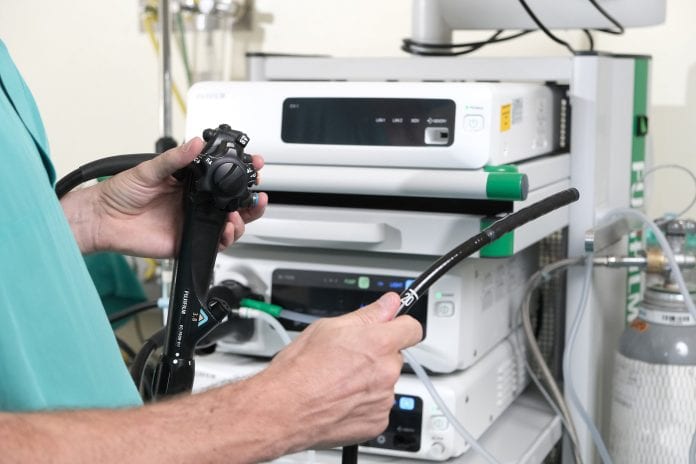
In this article, Mat Tallis, European Business Manager at Fujifilm Europe discusses the clinical perceptions of Artificial Intelligence (AI) in endoscopy.
We often hear about the impact of Artificial Intelligence (AI) on patients and healthcare practitioners – and the field of gastroenterology is no different. An early diagnosis of colorectal cancer can significantly improve patient outcomes and reduce the cost and complexity of treatment: five-year survival rates are around 90% when diagnosed at the localised stage, but 14% at the latest stage of progression. Human factors such as experience, fatigue and distraction are crucial to the effective detection of lesions, which is why AI could make a substantial difference.
How can AI support endoscopy?
To understand how AI can support those working on the frontline in endoscopy, Fujifilm initiated a unique survey of endoscopists, GI nurses, and GI surgeons working in the UK, France, Germany, Italy and Spain, in collaboration with the global clinical network, SERMO. We wanted to know exactly what our clinical community thinks – because as the users of our technology, they must be at the heart of everything we do – and the results are fascinating.
Clinicians across these five countries strongly support the use of AI in delivering better clinical care, with 71% of respondents telling us that the use of AI will help improve positive patient outcomes. Support for endoscopy systems with AI capabilities was also very high – with 80% of clinicians telling us that they would be more likely to use a platform which can utilise this technology.
Solutions for clinical practice
Fujifilm is constantly striving to develop new solutions to optimise clinical practice, augmenting endoscopists’ ability to detect even the smallest lesions. Research has shown that even a 1% increase in adenoma detection rate can lead to a 3% decrease in the risk of colorectal cancer, responsible for the deaths of approximately 228,000 people across Europe each year. Our survey demonstrated confidence in the endoscopy community in the ability of AI to reduce missed lesions, with the majority saying that it would increase their confidence in clinical-decision-making and help standardise their practice.
Given the pressures that COVID-19 is placing on health systems across Europe, clinicians need every tool at their disposal to help reduce backlogs and drive efficiencies at every stage of the patient pathway. This is certainly true in endoscopy and our survey demonstrated the value of AI in building endoscopy capacity. Over two thirds of respondents agreed that AI will increase the efficiency of their work, whilst over one third agreed that AI can help reduce waiting times for patients. Even prior to the current pandemic, demand for endoscopy services has continued to increase, and responses to the survey reflect the ongoing challenges faced across Europe. Respondents identified patient waiting times and growing demand for procedures as the most significant challenges facing endoscopists at this time.
There have been concerns raised in some sections of the profession that the introduction of these technologies may lead to the role of highly trained clinical experts eventually being superseded and subsequently replaced by AI. It was, therefore, welcome to see that the overwhelming majority (85%) of clinicians do not believe that AI will replace the role of an endoscopist.
Developing AI systems
At Fujifilm, we have a long history of pioneering technology in healthcare. Over the past seven decades, we’ve leveraged our imaging technology to become a global presence with an impressive track record in innovation – and AI is the next step.
Eluxeo Ultra is one of the first endoscopy systems to detect and characterise lesions in real-time. Working together with our existing Eluxeo platform, our new AI endoscopy technology, CAD EYE, provides enhanced support to the user, delivering our most powerful, complete and comprehensive package for endoscopists. CAD EYE was trained with our powerful supercomputer to assist endoscopists as a second pair of eyes.
As we continue to evolve our platform, support amongst the endoscopy community is vital to ensuring we leverage the opportunities that AI presents. The response to our survey certainly suggests that clinicians share our optimism, and we look forward to collaborating closely with our colleagues on the frontline, to continue improving patient care and quality of life.
References
- Cancer.net, Colorectal Cancer: Statistics (2020)
- Leufkens AM, van Oijen MG, Vleggaar FP, et al. Factors influencing the miss rate of polyps in a back-to-back colonoscopy study. Endoscopy. 2012;44:470-5.
- Artificial intelligence in gastrointestinal endoscopy: general overview https://www.ncbi.nlm.nih.gov/pmc/articles/PMC7004609/ (2020)
- SERMO survey of 300 clinicians, data on file (October 2020)
- SERMO survey of 300 clinicians, data on file (October 2020)
- Corley et al, Adenoma Detection Rate and Risk of Colorectal Cancer and Death (2014)
- Digestive Cancers Europe, Prevalence of Colorectal Cancer
- SERMO survey of 300 clinicians, data on file (October 2020)
- SERMO survey of 300 clinicians, data on file (October 2020)
- BMJ, National Census of UK endoscopy services in 2019 (2019)
- SERMO survey of 300 clinicians, data on file (October 2020)
Mat Tallis
Guest author
European Business Manager
Fujifilm Europe










great post